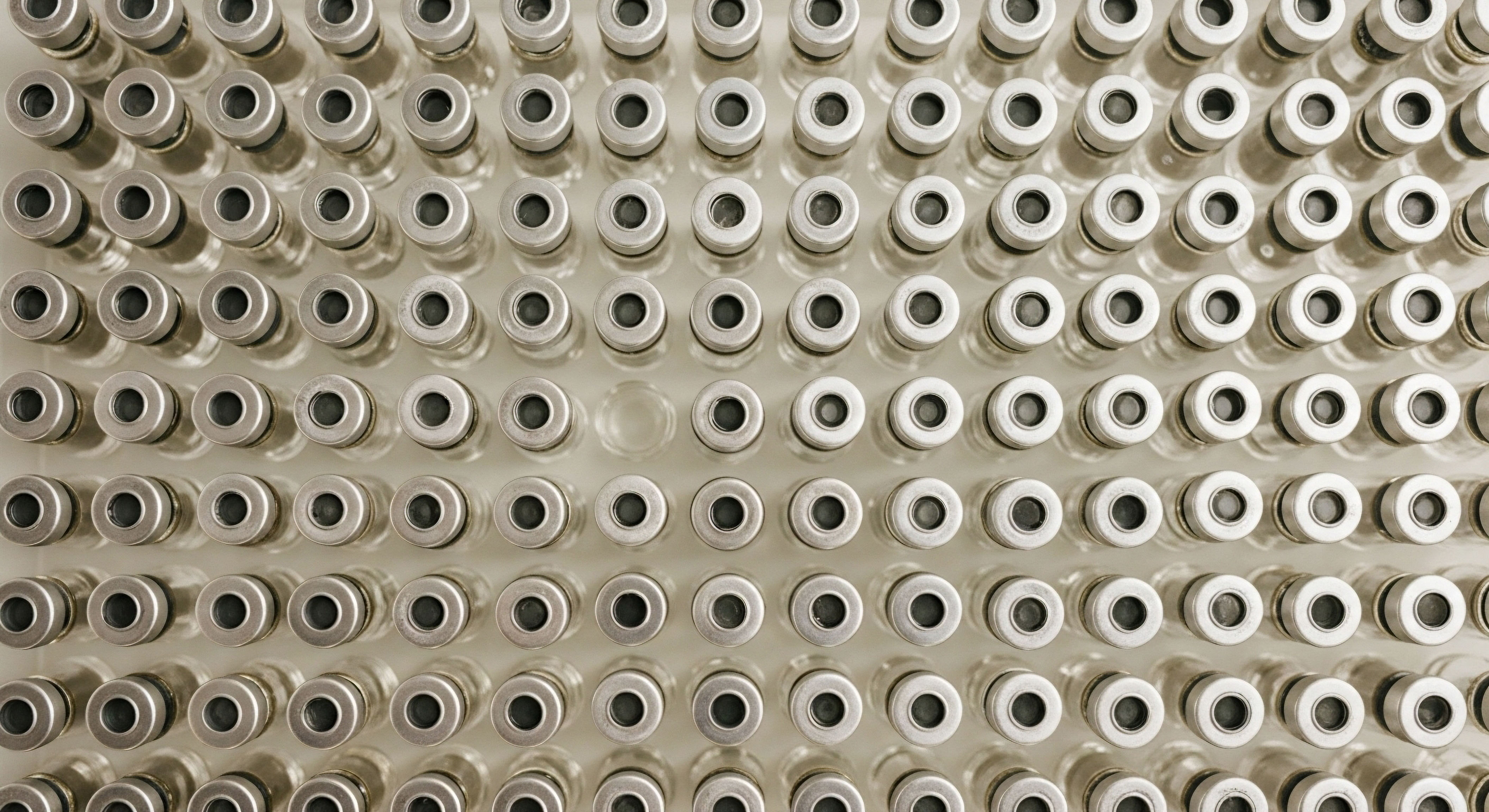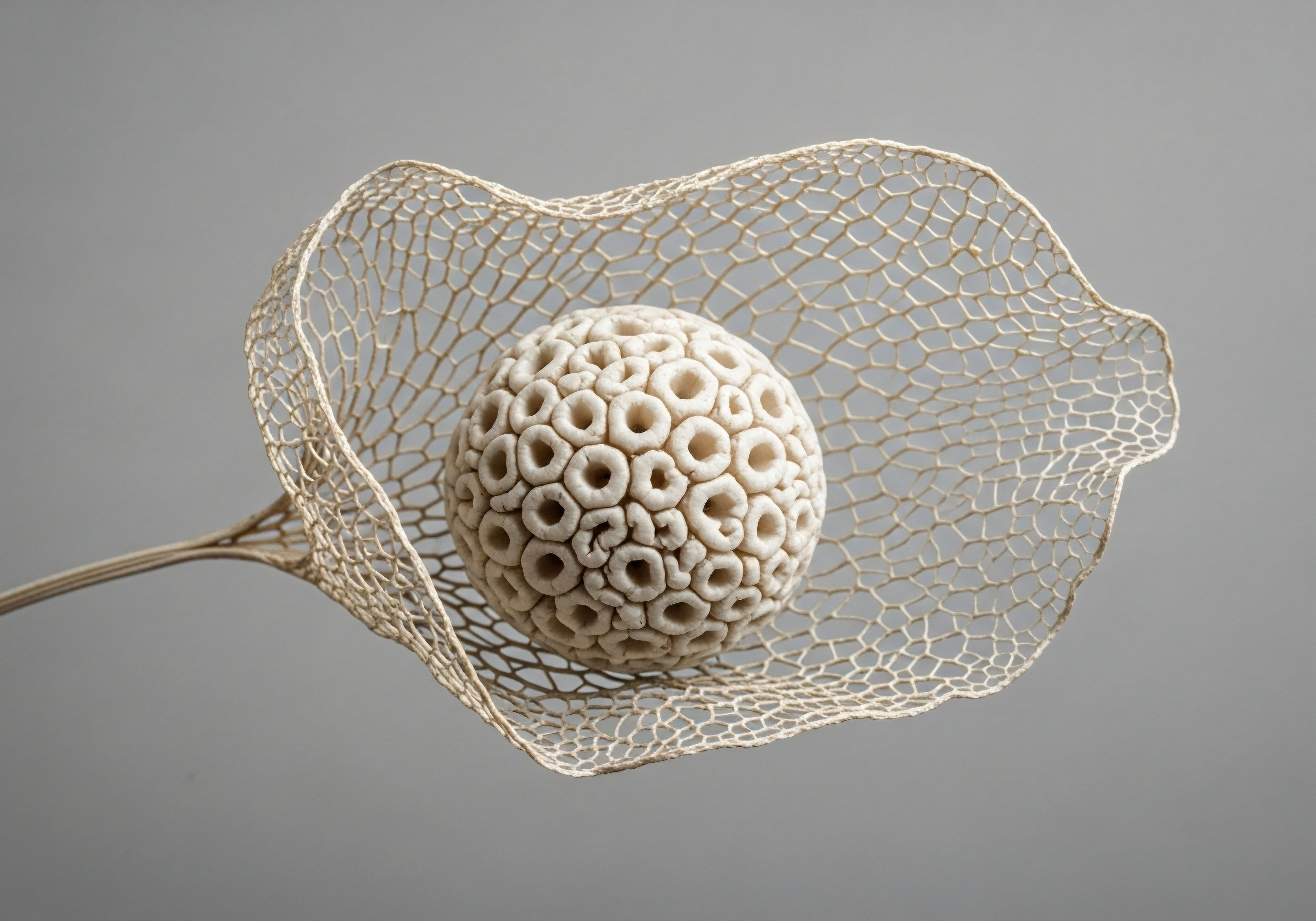

Fundamentals
You feel it before you can name it. A subtle shift in energy, a change in sleep patterns, or a persistent feeling that your body is operating with a depleted battery. These experiences are the entry point for many into understanding their own endocrine system.
This vast communication network, a series of glands producing the hormones that act as your body’s internal messengers, dictates everything from your metabolic rate to your mood. The long-term benefits of supporting this system without immediate pharmacological intervention are rooted in restoring your body’s innate capacity for self-regulation. It is about building a foundation of resilience from within, enabling your biological systems to function with efficiency and vitality.
Your endocrine system works through a series of sophisticated feedback loops. Think of the Hypothalamic-Pituitary-Gonadal (HPG) axis, the command line that connects your brain to your reproductive organs. The hypothalamus releases Gonadotropin-Releasing Hormone (GnRH), which signals the pituitary gland to produce Luteinizing Hormone (LH) and Follicle-Stimulating Hormone (FSH).
These hormones, in turn, instruct the gonads (testes in men, ovaries in women) to produce testosterone or estrogen. When levels are sufficient, a signal is sent back to the brain to slow production. This is a self-regulating circuit of profound elegance. When this system is supported through non-pharmacological means, its ability to self-correct and maintain equilibrium is enhanced, which is the very definition of long-term health.
Supporting your endocrine system naturally is about recalibrating your body’s internal communication network to enhance its own resilience and efficiency.
The conversation around hormonal health often gravitates toward replacement therapies. While protocols like Testosterone Replacement Therapy (TRT) for men or tailored hormonal support for women in perimenopause are powerful clinical tools, the groundwork for their success, and for overall wellness, is laid by non-pharmacological strategies.
These strategies directly influence the sensitivity of your cellular receptors and the efficiency of your hormonal production and clearance pathways. They are the essential precursors to any effective clinical intervention, creating a biological environment where such therapies can be most effective and sustainable.

The Science of Cellular Receptivity
Every hormone in your body has a corresponding receptor on the surface of a cell, a lock for its specific key. The effectiveness of a hormone is determined by the number and sensitivity of these receptors. Chronic stress, poor nutrition, and a sedentary lifestyle can lead to receptor downregulation, a state where cells become less responsive to hormonal signals.
It is like a radio signal being broadcast, but the receiver is turned down. Non-pharmacological support, particularly through targeted nutrition and consistent physical activity, can upregulate these receptors. This makes your cells more sensitive to the hormones your body naturally produces, allowing for more efficient signaling and a more balanced internal environment. This enhanced sensitivity is a cornerstone of long-term endocrine resilience.

How Does Lifestyle Influence Hormonal Balance?
Lifestyle choices are direct inputs into your endocrine operating system. Consistent sleep, for instance, is critical for the regulation of cortisol, your primary stress hormone, and for the nocturnal surge of growth hormone, which is vital for cellular repair. A diet rich in micronutrients provides the essential building blocks for hormone synthesis.
Physical activity, particularly resistance training, has been shown to improve insulin sensitivity and boost testosterone levels. These are not passive activities; they are active modulators of your entire endocrine cascade, shaping your hormonal landscape day by day.


Intermediate
Moving beyond foundational concepts, we arrive at the specific mechanisms through which non-pharmacological strategies confer lasting endocrine benefits. These interventions are about creating a state of metabolic flexibility and reducing the systemic inflammation that so often disrupts hormonal signaling.
The goal is to optimize the body’s internal environment to such a degree that its own regulatory systems can function without impediment. This approach builds a robust biological platform that can delay, reduce the need for, or enhance the efficacy of future pharmacological interventions.
One of the most significant long-term benefits is the preservation and enhancement of insulin sensitivity. Insulin, a hormone produced by the pancreas, is the primary regulator of blood glucose. A diet high in refined carbohydrates and a lack of physical activity can lead to insulin resistance, a condition where cells fail to respond efficiently to insulin’s signal.
This state is a precursor to type 2 diabetes and creates a cascade of hormonal dysregulation, including elevated androgens in women and suppressed testosterone in men. Non-pharmacological interventions, such as a low-glycemic diet and regular exercise, directly combat insulin resistance, thereby restoring a critical pillar of endocrine health. This not only reduces the long-term risk of metabolic disease but also helps to rebalance the entire hormonal milieu.

Strategic Interventions for Endocrine Resilience
A structured approach to non-pharmacological support involves several key pillars, each targeting a specific aspect of endocrine function. These are not separate tactics but an integrated system designed to work synergistically.

Nutritional Endocrinology the Power of Food as Information
The food you consume provides more than just calories; it delivers information that directs cellular function. A diet centered on whole, unprocessed foods provides the essential co-factors for hormone production and metabolism.
- Micronutrients for Hormone Synthesis Zinc is essential for testosterone production, while selenium is critical for the conversion of thyroid hormones. A diet rich in a variety of vegetables, nuts, and seeds ensures an adequate supply of these vital building blocks.
- Fiber for Estrogen Clearance Soluble and insoluble fiber from plant sources aids in the detoxification and excretion of excess estrogens through the digestive tract, a crucial process for maintaining a healthy estrogen-to-progesterone balance.
- Healthy Fats for Steroid Hormone Production Cholesterol is the precursor molecule for all steroid hormones, including testosterone, estrogen, and cortisol. A diet containing healthy fats from sources like avocados, olive oil, and nuts supports the fundamental production of these critical messengers.
Strategic lifestyle interventions directly improve insulin sensitivity, a cornerstone of metabolic health that influences the entire endocrine system.
The Mediterranean diet, for example, has been shown in clinical trials to reduce the incidence of type 2 diabetes and improve cardiovascular risk factors, all of which are intimately tied to endocrine function. This dietary pattern, rich in anti-inflammatory compounds and healthy fats, directly supports the body’s ability to manage glucose and maintain hormonal equilibrium.

The Role of Physical Activity in Hormonal Regulation
Exercise is a potent modulator of the endocrine system. Different forms of activity elicit distinct hormonal responses, which can be leveraged to achieve specific wellness goals.
| Type of Exercise | Primary Hormonal Effect | Long-Term Endocrine Benefit |
|---|---|---|
| Resistance Training | Increases testosterone and growth hormone | Improved muscle mass, metabolic rate, and insulin sensitivity |
| High-Intensity Interval Training (HIIT) | Enhances catecholamine (adrenaline) release | Improved cardiovascular health and metabolic flexibility |
| Endurance Training | Improves cortisol regulation | Enhanced stress resilience and reduced chronic inflammation |
By strategically incorporating these different modalities, one can create a comprehensive physical conditioning program that supports multiple facets of endocrine health. This not only improves current hormonal function but also builds a reserve of metabolic health that can buffer against age-related decline.


Academic
A deeper, more technical examination of non-pharmacological endocrine support reveals its profound impact on the intricate molecular and cellular pathways that govern metabolic health and longevity. The long-term advantages are not merely about symptom management; they are about fundamentally altering the trajectory of age-related endocrine decline by influencing gene expression, reducing oxidative stress, and preserving the functional integrity of the neuroendocrine axes.
This systems-biology perspective allows us to appreciate how targeted lifestyle inputs can induce a state of heightened biological resilience.
The concept of hormesis is central to understanding the benefits of certain non-pharmacological stressors, such as exercise and caloric restriction. Hormesis is a biphasic dose-response relationship in which a low dose of a stressor induces a protective, adaptive response.
For instance, the metabolic stress induced by high-intensity exercise activates signaling pathways like the AMP-activated protein kinase (AMPK) pathway. AMPK is a master regulator of cellular energy homeostasis. Its activation promotes glucose uptake into muscles, stimulates fatty acid oxidation, and inhibits cholesterol synthesis. Over the long term, consistent activation of AMPK through exercise leads to durable improvements in insulin sensitivity and a reduction in visceral adiposity, both of which are critical for sustained endocrine health.
Targeted lifestyle inputs can fundamentally alter the trajectory of age-related endocrine decline by influencing gene expression and preserving neuroendocrine function.

The Hypothalamic-Pituitary-Adrenal Axis and Stress Resilience
Chronic psychological stress is a potent disruptor of endocrine function, primarily through its effects on the Hypothalamic-Pituitary-Adrenal (HPA) axis. Persistent activation of the HPA axis leads to chronically elevated cortisol levels, which can induce insulin resistance, suppress immune function, and disrupt the production of gonadal hormones.
Non-pharmacological interventions like mindfulness meditation and restorative sleep have been shown to modulate HPA axis activity. They can lower basal cortisol levels and improve the sensitivity of the glucocorticoid receptors that provide negative feedback to the hypothalamus and pituitary. This recalibration of the HPA axis is a critical long-term benefit, as it restores the body’s ability to mount an appropriate stress response without suffering the collateral damage of chronic cortisol exposure.

How Do Lifestyle Factors Impact Cellular Senescence?
Cellular senescence is a state of irreversible cell cycle arrest that contributes to aging and age-related diseases. Senescent cells accumulate in tissues over time and secrete a cocktail of inflammatory proteins known as the senescence-associated secretory phenotype (SASP).
The SASP contributes to a state of chronic, low-grade inflammation, or “inflammaging,” which is a known disruptor of endocrine function. Lifestyle interventions can mitigate the accumulation of senescent cells. For example, compounds found in a plant-rich diet, such as quercetin and fisetin, have demonstrated senolytic properties, meaning they can selectively induce the clearance of senescent cells.
Regular physical activity has also been shown to reduce the burden of senescent cells in various tissues. By mitigating cellular senescence, these non-pharmacological strategies help to preserve tissue function and reduce the inflammatory noise that can interfere with delicate hormonal signaling.

Systemic Effects on Metabolic Endotoxemia
The integrity of the gut barrier is another critical, though often overlooked, component of endocrine health. A compromised gut lining can allow bacterial components, such as lipopolysaccharides (LPS), to leak into the bloodstream, a condition known as metabolic endotoxemia. LPS is a potent trigger of inflammation and has been shown to contribute to insulin resistance and disrupt thyroid function.
A diet high in processed foods can damage the gut barrier, while a diet rich in fiber and fermented foods can enhance its integrity. By supporting a healthy gut microbiome and a robust intestinal barrier, these dietary strategies reduce the systemic inflammatory burden, thereby protecting the endocrine system from this insidious source of disruption.
| Intervention | Molecular Target | System-Level Outcome |
|---|---|---|
| Caloric Restriction | Sirtuin Activation | Improved cellular repair and metabolic efficiency |
| Resistance Training | mTOR Pathway | Increased muscle protein synthesis and glucose uptake |
| Plant-Rich Diet | NRF2 Pathway | Enhanced antioxidant defense and detoxification |
| Mindfulness Practice | HPA Axis Regulation | Reduced cortisol output and improved stress resilience |
These interventions, when applied consistently over the long term, do more than just support the endocrine system. They actively build a more robust, resilient, and self-regulating biological organism, capable of navigating the physiological challenges of aging with greater vitality and function.

References
- Chen, L. Pei, J. H. Kuang, J. Chen, H. M. Chen, Z. Li, Z. W. & Yang, G. Z. (2015). Effect of lifestyle intervention in patients with type 2 diabetes ∞ a meta-analysis. Metabolism, 64(2), 338-347.
- Gillies, C. L. Abrams, K. R. Lambert, P. C. Cooper, N. J. Sutton, A. J. Hsu, R. T. & Khunti, K. (2007). Pharmacological and lifestyle interventions to prevent or delay type 2 diabetes in people with impaired glucose tolerance ∞ systematic review and meta-analysis. Bmj, 334(7588), 299.
- Knowler, W. C. Barrett-Connor, E. Fowler, S. E. Hamman, R. F. Lachin, J. M. Walker, E. A. & Nathan, D. M. (2002). Reduction in the incidence of type 2 diabetes with lifestyle intervention or metformin. New England journal of medicine, 346(6), 393-403.
- Li, G. Zhang, P. Wang, J. Gregg, E. W. Yang, W. Gong, Q. & Bennett, P. H. (2008). The long-term effect of lifestyle interventions to prevent diabetes in the China Da Qing Diabetes Prevention Study ∞ a 20-year follow-up study. The lancet, 371(9626), 1783-1789.
- Salas-Salvadó, J. Bulló, M. Babio, N. Martínez-González, M. Á. Ibarrola-Jurado, N. Basora, J. & Ros, E. (2011). Reduction in the incidence of type 2 diabetes with the Mediterranean diet ∞ results of the PREDIMED-Reus nutrition intervention randomized trial. Diabetes care, 34(1), 14-19.

Reflection
You have now seen the architecture of your own internal communication system and the profound influence that conscious daily choices can have on its function. The information presented here is a map, showing the connections between how you live and how you feel. The journey of reclaiming your vitality begins with this understanding.
It is a process of turning abstract knowledge into lived experience, of observing the subtle shifts in your own body as you implement these strategies. Your personal biology is the ultimate testing ground, and your lived experience is the most valuable data. This knowledge is the first step; the next is to apply it, to listen to your body’s response, and to build a personalized protocol for lifelong wellness.



